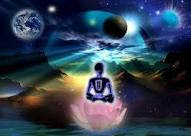Hinduism is a diverse system of thought with beliefs spanning around the following concepts.
1. Monotheism. It is the belief in the existence of one God or in the
oneness of God.
2. Polytheism. It is the belief of multiple deities also usually assembled
into a pantheon of Gods and Goddesses, along with their own mythologies
and rituals.
3. Panentheism. It is the view that everything is part of an all encompassing immanent God or that the Universe and God are identical.
4. Monism. It is a point of view within metaphysics which argues that the variety of existing things in the universe are reducible to one substance or reality and therefore that the fundamental character of the universe is unity.
5. Atheism. Disbelief in God.
The concept of God is complex and depends upon each individual and tradition and philosophy followed.
It is also referred as henotheistics ie involving devotion to a single god while accepting the existence of others.
As per Advaita Vedanta, the Atman is ultimately distinct from Brahman, the supreme spirit. Hence, these schools are called non-dualist.
The goal of life, is to realize that one's atman is identical to Brahman the supreme soul.
The Upanishads state that whoever becomes fully aware of the atman as the innermost core of one's own self realizes an identity with Brahman and thereby reaches Moksha (liberation of freedom).
The schools of Vedanta and Nyaya states that Karma itself proves the existence of God. Nyaya being the school of logic, makes the logical inference that the Universe is an effect and it ought to have a creator.
The atman is dependent on God, while moksha depends on love towards God and on God's grace. When God is viewed as the supreme personal being, God is called Ishvara, Bhagavan or Parameshwara.
DEVAS
The Hindu scriptures refer to celestial entities called devas " the shining ones" which is translated as Gods or heavenly things.
AVATAR
Hindu epics and the Puranas relate several episodes of the descent of God to Earth in corporeal form to restore dharma to society and to guide humans to moksha. Such an incarnation is called an Avatar.
KARMA
Karma translates literally as action, work or deed, and can be described as the "moral law of cause and effect".
SAMSARA
According to the Upanishads an individual, known as Jiva-atma develops sanskaras from actions whether physical and mental.



No comments:
Post a Comment